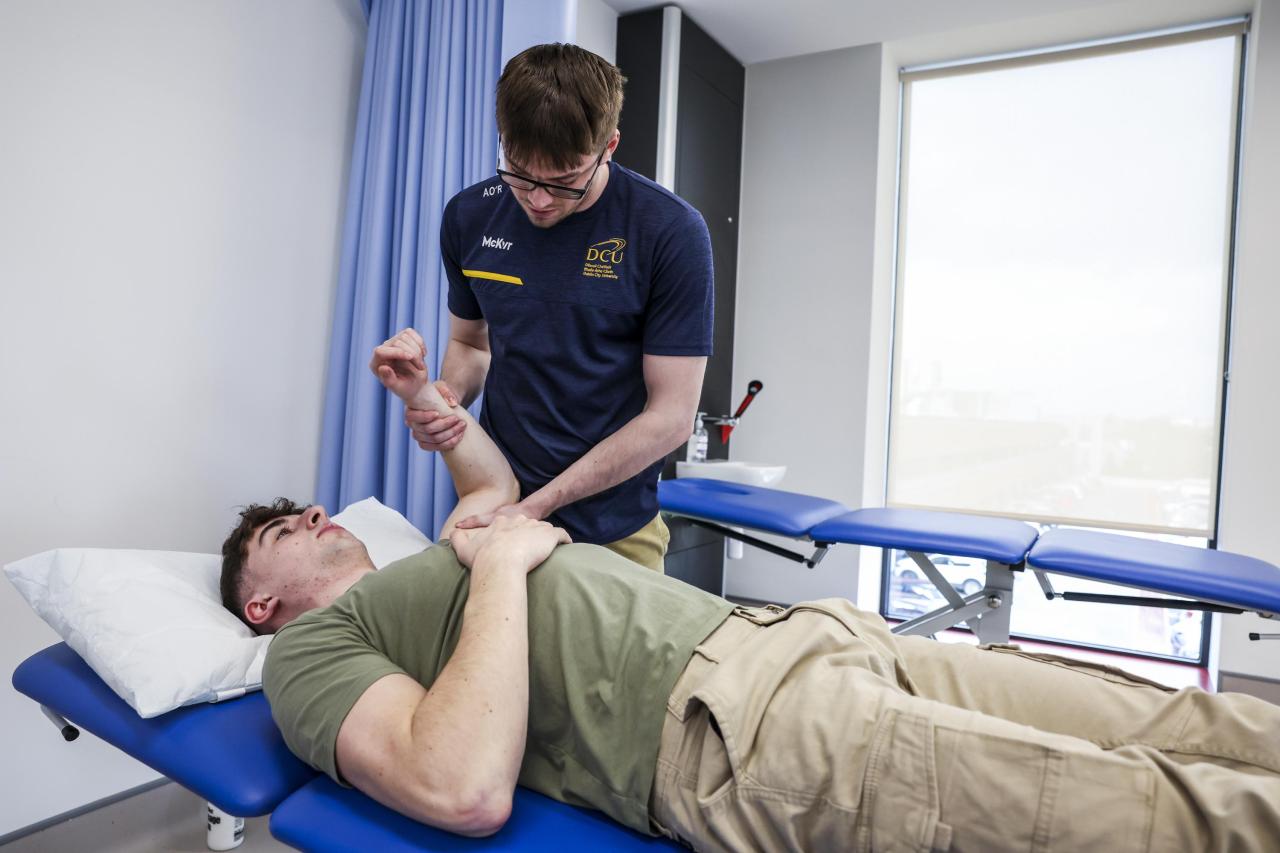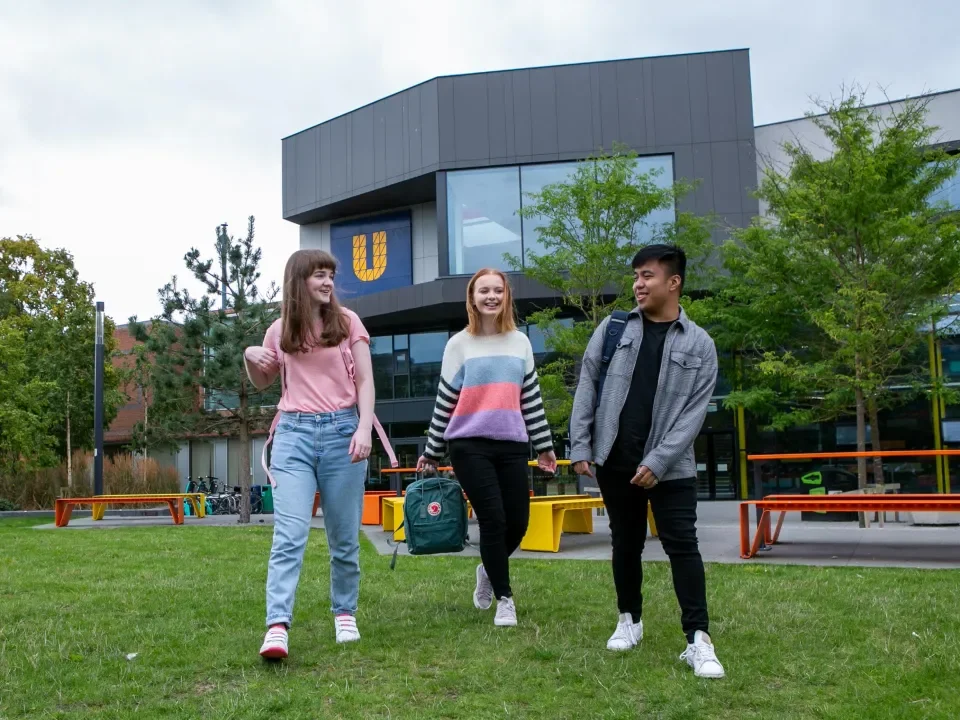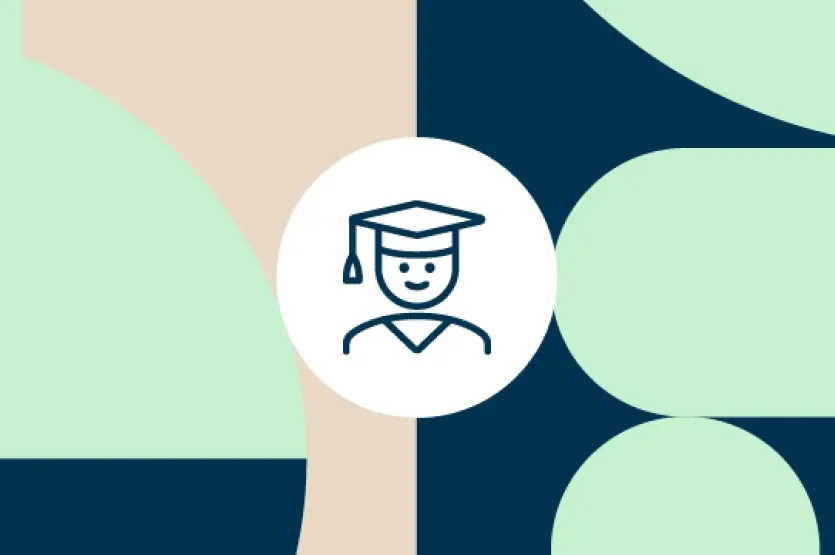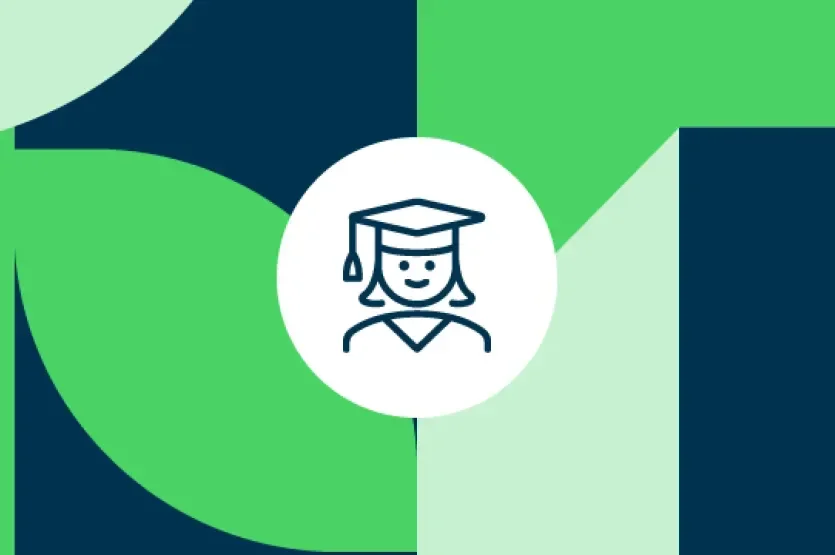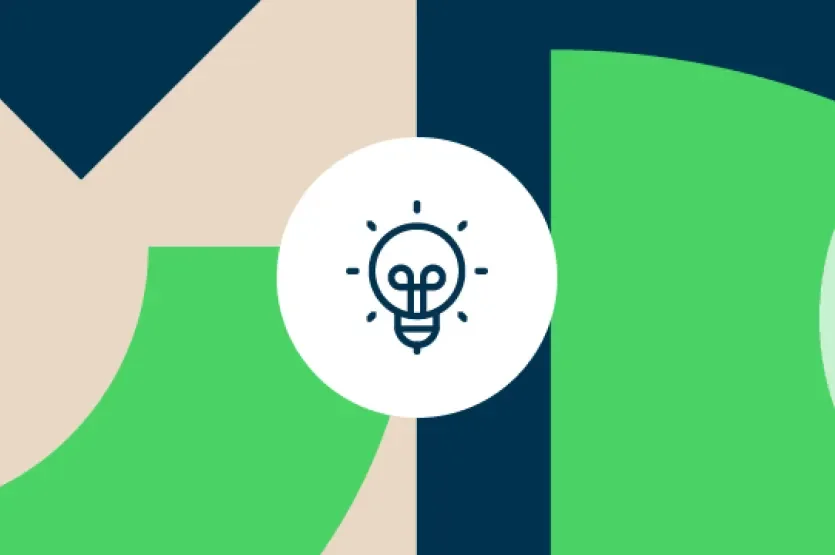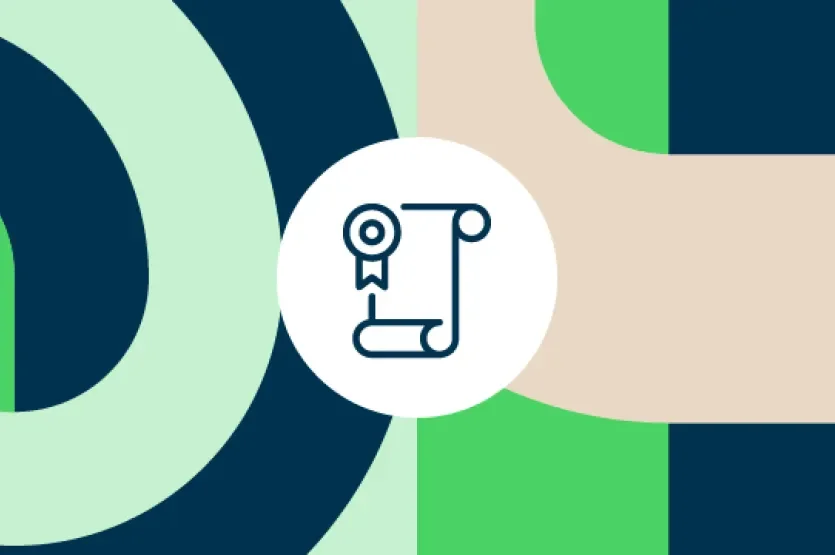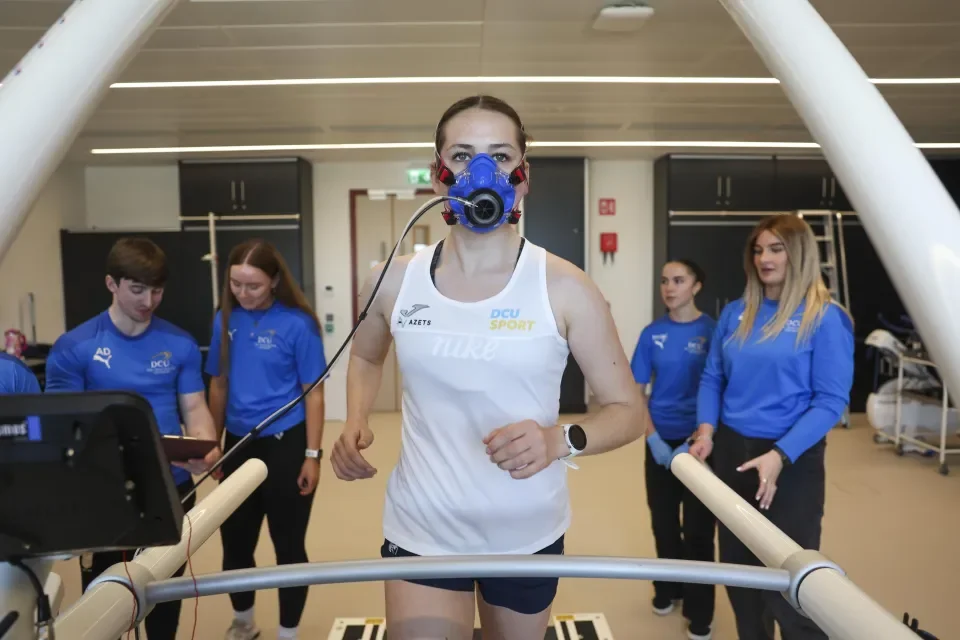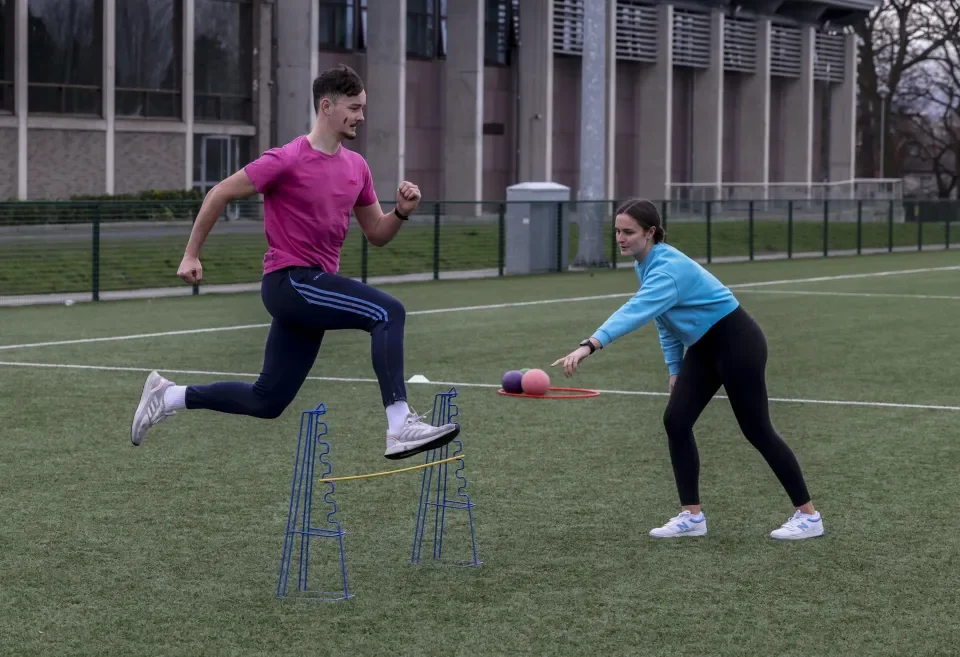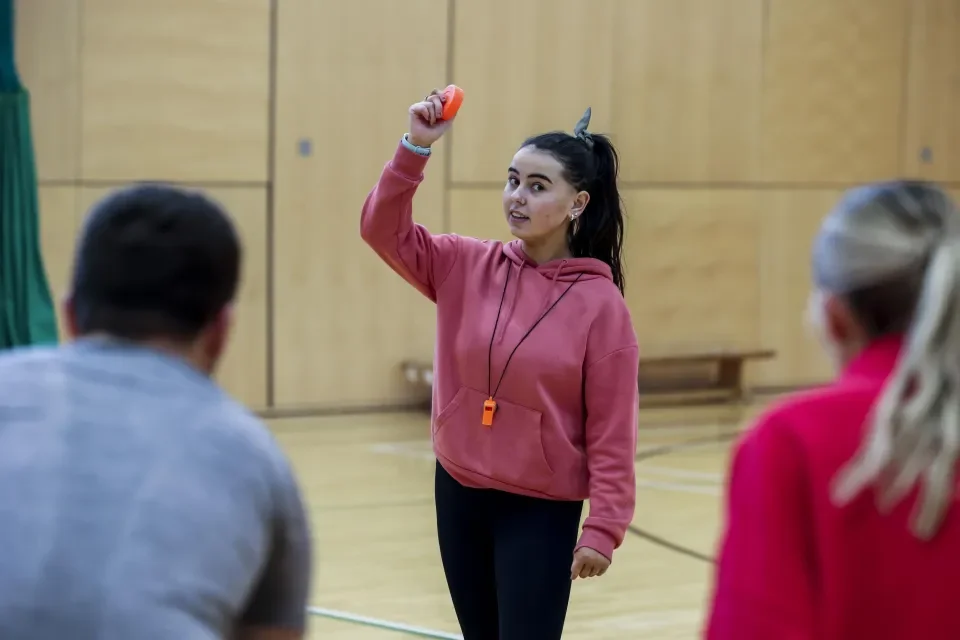Overview
By doing this course, you’ll become an expert therapist skilled in preventing, assessing, treating and rehabilitating injuries associated with physical activity, including those experienced by elite athletes.
Incorporating multiple work placements, this course gives you extensive theoretical knowledge of how the body works and then shows you how to apply that expertise. It is an intensive, highly practical programme that immerses students in musculoskeletal medicine from an early stage.
Practical experience at home and abroad
You’ll learn how to assess, treat and rehabilitate in theory and, from second year, in real-world settings. You’ll complete placements in sports medicine clinics and rehabilitation clinics, as well as undertaking pitchside and team placements. In your final year, you’ll do a semester-long immersive placement, which could be in an athletic therapy clinic or a professional sports team. These placements may be completed in Ireland but most students go to the US, Canada, Australia or Britain.
This course is accredited by Athletic Rehabilitation Therapy Ireland. When you graduate, you’ll be eligible to become a certified Athletics Therapist. As an independent, highly skilled clinician with a wealth of experience, you’ll be highly sought after in sports medicine, by musculoskeletal clinics or with a sports team, or you can go on to work as a researcher in musculoskeletal medicine.
Why DCU
DCU People
Careers & Further Options
Careers
The clinical experience gained in Year Four gives you a genuine competitive edge with employers when you graduate. The course equips you with the skills to pursue a career in looking after the health of both athletes and the general public.
- Sports injury clinics
- Sports clubs and teams
- National governing bodies of sports associations
- Health and fitness centres
- Self-employed athletic therapist and trainer
DCU graduates are highly sought after by employers. Our Graduates work in environments ranging from large multinationals to SMEs, family businesses and start-ups across every sector.
DCU Careers Service has a number of learning and development initiatives in place for our students, giving them the skills they need for a successful career path.
Entry Requirements
In addition to the general entry requirements for admission to the university the following entry requirements apply
Minimum of O4 or H6 in Mathematics and minimum of O4 or H6 in one of Physics, Chemistry, Biology, Physics with Chemistry or Agricultural Science
In addition to the general entry requirements for admission to the university the following entry requirements apply
GCE A Level D or GCE AS Level C or GCSE C Mathematics and GCE A Level D or GCE AS Level C or GCSE C in one of Physics, Chemistry, Biology, Physics with Chemistry or Agricultural Science
Please visit our Admissions webpage for details on course requirements or how to apply to DCU.
Please visit our QQI FET webpage for details on DCU courses, open days, campus tours or school visits.
To apply to DCU, please visit www.cao.ie.
Mature entry is a competitive process. Applicants must demonstrate:
- a genuine interest in the programme(s) they are applying for
- academic experience and competency in their chosen field of study
- an ability to engage and succeed on the programme
All applicants must complete a statement of interest to be considered for the mature application route.
For further guidance on the mature application process please see the CAO Website
Additional Criteria
This programme requires evidence of competency in Mathematics and one of Physics, Chemistry, Biology, Physics with Chemistry or Agricultural Science, which would equate to a O4/H6 in these subject areas. This requirement is essential for this programme. Applicants can show their strength in this through formal examinations e.g. school leaving examinations, QQI-FET, access programmes, or other third level qualifications. If applicants don’t have any relevant examinations, they may be able to meet the requirements through their work and life experience, applicants must give examples of this experience to demonstrate their competency in these areas in their personal statement.
Applicants that have completed at least one year of study at NFQ Level 6, 7 or 8 at another institution may apply to continue their studies on a similar programme at DCU. There should be substantial overlap in content between the two programmes to be considered for a transfer. Results and other supporting documentation must be submitted to CAO by the closing date of 1st July. This is a competitive application process for a small quota of advanced entry places. Offers are made on a rolling basis until all places are filled. Early application is advised. Please note: Applicants should also consider applying through the appropriate route for first year entry to the programme they are interested in. This application process is only for advanced entry.
Accreditation
The BSc in Athletic Therapy and Training is accredited by the professional body for athletic therapy in Ireland, Athletic Rehabilitation Therapy Ireland (ARTI). In order to become a full member of ARTI, candidates must demonstrate that they have met all the required educational competencies. Therefore, there may only be certain circumstances when a candidate is eligible for advanced entry. Additionally, it is only possible to apply to transfer into year 2, there are no courses which guarantee access to the BSc in Athletic Therapy and Training and there is no guarantee that a space will be available.
International candidates are expected to have educational qualifications of a standard equivalent to those outlined above. In addition, where such candidates are non-native speakers of the English language they must satisfy the university of their competency in the English language. For further information on international applications click here.
Course Structure
This is a 4/5-year BSc in Athletic Therapy and Training degree (with the option to undertake an integrated Masters degree in Athletic Therapy and Strength and Conditioning from Year 4 subject to achieving a H2.2. or higher in Years 1 and 2).
- Anatomy
- Strength and conditioning 1: Introduction to Exercise Science
- Physics for Health Science
- Motor Control and Learning
- Introduction to Athletic Therapy and Training
- Sport and Exercise Physiology
- Strength and Conditioning 2: Theoretical Approaches
- Injuries
- Introduction to Clinical Practice
- Sport and Exercise Biomechanics
- Integrated Sport and Exercise Physiology
- Emergency Care
- Injury Prevention
- Ethics, Medicolegal and Consultation Skills
- Psychology of Injury
- Injuries
- Nutrition
- Soft Tissue Therapies
- Injury, Exercise and Sport Biomechanics
- Rehabilitation and Chronic Illness Rehabilitation
- Clinical Reasoning in Practice
- Applied Modalities and Clinical Practice
- New Enterprise Development
- Research Methods
- Clinical Experience
- Independent Clinical Practice
- Medicine in Sport
- Research Project
- Strength and Conditioning 3
- Developing the Clinician and the Strength and Conditioning Professional
Year 5 option of masters (MSc)
- Conditioning Exercise as Medicine
- Strength and Conditioning 4
- Clinical Exercise Physiology for Strength and Conditioning
- Research Project 2
- Advanced Clinical and Rehabilitation Experience
- Planning Skills for Sport Professionals
Fees and Funding
Fees
How To Apply
Apply through the Central Applications Office (CAO) at cao.ie by 1st February or 1st May
To apply for this programme:
Candidates should apply directly here. Here's a quick step by step guide if you need help with your application.
Please provide
- Academic Transcripts for each and every year of study with English translation, if applicable.
- If applicable, provide evidence of competence in the English language as per DCU entry requirements.
Applications are accepted on an ongoing basis up to 1st July. All Non-EU candidates are advised to apply early, as places are limited.
All mature applicants apply through the CAO by 1st February. For further information and for special application procedures for mature students, please click here
EU applications are made via the CAO Advanced Entry route which will open on the 5th of November until 1st July.
Please see Application Procedures or E-mail ugadmissions@dcu.ie.
Life On Campus
At DCU, our students can expect a unique campus experience. We are known for our excellent teaching and learning facilities, our active clubs and societies, and our great social and sporting facilities. All this makes DCU an exciting place to be.
DCU has three academic campuses; Glasnevin, St. Patrick’s and All Hallows (both in Drumcondra), all close to Dublin City centre.
They can be reached by public transport, Dublin Bus and Bus Éireann, with our Drumcondra campuses a ten minute walk from Drumcondra Train Station. Glasnevin is a 20 minute walk from St Patrick’s and All Hallows. They are also linked by Dublin Bus.
Each campus has a library (O’Reilly, Cregan and Woodlock Hall), study spaces, restaurants, and on-campus residencies. There are sports facilities on Glasnevin and St. Patrick’s, and there is a dedicated sports campus, St Claire’s, located near Glasnevin on the Ballymun Road.
DCU’s 19,000 students have access to exceptional teaching and learning facilities across our three academic campuses.
These include modern learning theatres, research centres, a new media and TV studio, radio/podcast studios, computer suites and advanced labs in the areas of Languages, Engineering, Physics, Chemistry and Biotechnology, as well as a Sports Performance centre and a training hospital ward. In 2021, we opened our first virtual reality ‘Leadership Lab’, which is located in our Business School.
We continue to improve and update our facilities. For example, construction of a new world-class STEM facility is underway on the Glasnevin campus. With capacity for an extra 3,000 STEM students, this facility will advance DCU’s international reputation for excellence in science and health, computing and engineering disciplines.
Studying in DCU isn’t just about course work. The university is rich in student life and activities.
There are more than 140 clubs and societies for students in DCU, with ‘Clubs & Socs’ days taking place on both the Glasnevin and Drumcondra campuses at the start of the academic year. They span everything from rugby to rock climbing, anime to jazz.
For many students, sport is an important part of the DCU experience. DCU’s Sports Complex boasts a 25 metre swimming pool, fitness centre gym, all-weather pitches and squash courts, as well as soccer, GAA and rugby pitches. DCU Dóchas Éireann, the university’s GAA club, is the largest third level Gaelic Games club in the country. Meanwhile, DCU Athletics has been Ireland’s highest achieving university club for many years. And DCU has dozens of other clubs to get involved in, from Archery to Weightlifting.
The Glasnevin campus is home to our purpose built, state-of-the-art student centre, The U, which serves the needs of a rapidly growing student body. Here, you will find the Student Leadership and Lifeskills Centre, performing arts and cultural spaces for students and the wider community, and the Entrepreneurship and Innovation Hub. Also located on our Glasnevin campus is The Helix, our renowned performing arts centre.
On our St Patrick’s campus, we have the Java Student Hub, a vibrant, warm and welcoming space where students can meet for coffee, play music, use the projector to watch events, or just relax. The walls of the Java Hub were designed based on the cultural history of St Patrick’s Campus, including the special references to the notable sporting history and history of the arts.
We have a number of academic, professional and social supports for students.
Student Advice & Learning Skills Centre - Offers a wide range of supports and services to students and advice
The Writing Centre - drop-in writing workshops for students through the academic year
Maths Learning Centre - provides maths support for students of all ability levels with maths modules
Student Learning - facilitate the transition from passive to active learning for students at DCU, by teaching study skills, nurturing critical thinking and building student confidence.
Careers work with students to help them on their professional journey into graduate employment.
Our student support team offers a comprehensive support programme, helping students make that all important transition into university life and focusing on building confidence and skills which are key to success at third level.

DCU Glasnevin Campus
FAQs
What is the difference between athletic therapy and training and physiotherapy?
Physiotherapy: a more general programme which includes treatment of non-musculoskeletal illnesses such as: cardiac and respiratory illness, neurological conditions such as stroke, spinal cord injuries, and many other conditions.
Athletic Therapy and Training: has a complete focus on musculoskeletal injuries, their prevention, assessment, treatment and rehabilitation.
What postgraduate programmes can i go on to study after the BSc in Athletic Therapy and Training?
Some of our graduates have gone on and applied to and secured places in postgraduate Occupational Therapy (OT) programmes. Others have applied for and studied Speech and Language Therapy and Physiotherapy. Those postgraduate programme application processes are competitive and require certain grades (and maybe other conditions, which are subject to change). Many of our graduates have had to study these in the UK due to limited places in Ireland. Our careers office staff support our students to look at all the options.
Other graduates have studies Human Resource Management, Immunology, Global Health & Immunology, Audiology, Public Health, Healthcare Policy & Management and many other programmes in Ireland and overseas.
How detailed are the science subjects in the sports science course and would it be manageable if I didn't do biology/chemistry/physics for LC?
Students are required to complete a module in both chemistry and a module in physics in the first year of the ATT cand SSH courses. Students who have not completed this subject at LC will still be able to successfully complete the module as part of this course and there is additional support available.
Is DCU all one campus?
DCU is a multi campus university - the Glasnevin, St Patrick's and All Hallows campuses. The St Patrick's campus is where the Education courses are taught and some of the subjects from the BA Joint Honours degree. There is a 20-25 minute walk between the campuses but there are buses and bikes available to go between them also.
Click here to see maps of all of our campuses
If I'm studying on the St Patrick's campus, can I use the library and sports centre on the Glasnevin campus?
Yes, all facilities such as sports and accommodation are open for all DCU students to avail of.
Are there libraries in DCU and if they have wifi and work stations?
We have a brand new state of the art four floor library on our St. Patrick's Campus which complements the existing library on the Glasnevin campus. There is free wifi, work stations as well as desktop computers.
Does DCU provide accommodation?
DCU does have on-campus accommodation for undergraduate and postgraduate students, and you can find out more and apply via the Accommodation Office webpage.

